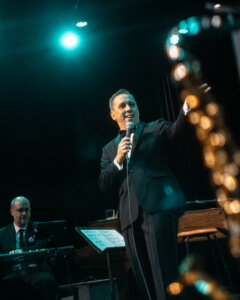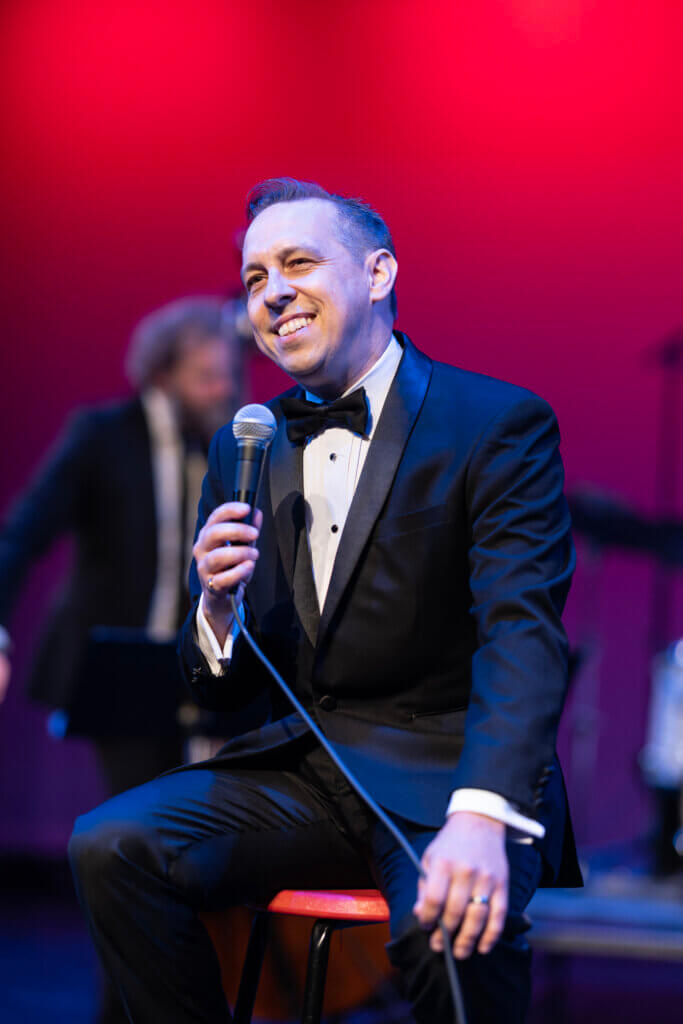
“He would drive this big old clunker and listen to the radio … and he would whistle,” Wichmann said. “Every great American songbook song, he knew the title.”
Wichmann’s roots run deep in the blue-collar soil that covers the Northeast. His father’s hands, he remembers, were “never fully clean,” the grooves and joints tattooed by grime and soot. They were a lunch-pail people, not performers. But the songs they whistled and the stories they told formed grooves of their own, imprinted on Wichmann’s heart.
“I wish my grandparents could see these shows,” said Wichmann, known now as Mister Showtime in Virginia music and theater circles. “They are in every one of those songs.”
The foundation for Mister Showtime was laid in Scranton, Pennsylvania. His mother enrolled him in a local youth acting class, an effort to keep a restless 11-year-old in check on Saturday mornings. Nothing much seemed to come of it, until a year later when the drama teacher called to encourage Wichmann to audition for a part in a production of “A Thousand Clowns” at the Scranton Public Theater.
Wichmann beat out 50 or so other kids for the only non-adult lead role, placing him under the direction of accomplished playwright and actor Jason Miller, best known for playing Father Karras, the priest opposite the head-spinning demoniac in “The Exorcist.”
“I got cast in this show and, next thing you know, I’m working with someone notable for being in a movie I’m not even old enough to watch,” Wichmann said. “It was a crash education on what it is to take something really seriously. So that sort of launched the passion.”
Soon after, Wichmann’s family moved to Pittsfield, Massachusetts. The local public school offered an immersive four-year drama program, a soft landing for Wichmann’s growing interest in the stage. There, he rubbed shoulders with future star Elizabeth Banks, of “Hunger Games” fame, before making a dent in college drama productions at Wagner College on Staten Island.
“I did a lot of shows there, and you all get launched out of the cannon of college theater,” Wichmann said. “Everybody is sort of like greyhounds; the gate opens, and everybody is just off.”
The recent theater grad, eager to make his mark, first had to make rent. Between auditions, he worked in a dentist’s office, as a toy demonstrator, and, like any aspiring performer worth their salt, bussing tables at restaurants.
Eventually, he landed at Busch Gardens Williamsburg. Six times a day, he was Northrup, a sorcerer’s apprentice in “The Enchanted Laboratory,” a low-tech, mostly one-man show he’d go on to perform more than 2,000 times over the course of a couple years. While not exactly a fast track to the Hollywood Walk of Fame, it was a paying gig and an exhaustive exercise in stage presence – a “show biz boot camp,” said Wichmann. It also led him to the Richmond regional theater community, where his career gained traction.
“Next thing you know I was doing commercials, bit parts on television, I got to work with Stephen Spielberg in ‘Lincoln’ and with Ethan Hawke on ‘The Good Lord Bird.’ You’re making this living that’s kind of like … trying to cook six meals at the same time between theater and television and film parts and voiceovers,” Wichmann said. “(I) was doing pretty well at it, but I was also kind of getting in my own way.”
“Smoking and drinking and jazz clubs go hand in hand,” said close friend Desirée Roots, a star of the Richmond music and theater scene. “Even though he was drinking, it never impacted his stage performance,” but “the binging, the baggy eyes,” revealed that Wichmann was too often finding his way to the bottom of a bottle.
“There’s a point at which the party stops, and if you keep going beyond that,” Wichmann said, before pausing to reflect. “I have a family history of alcoholism, and I knew I needed to remove this from my life if I’m ever going to be able to do anything noteworthy.”
In 2003, Wichmann quit drinking and took up running, lacing up his sneakers for the occasional marathon, even. No longer viewing life through the prism of the bottle, his vision cleared. Nothing seemed out of reach.
“(At 34) I feel like I’m 18 again. I kind of reset the odometer a bit,” Wichmann said. “And I’m like, ‘Um, I wonder if I could become a reservist?’”
He had flirted with the idea of joining the Navy in college, even visiting a recruiter. But it “sat in the theoretical closet along with the guitar and the karate uniform,” another good idea that atrophies into a memory. But now, “everything in life had a new car smell,” and sobriety resurrecting what once seemed dead.
“I didn’t want to be the guy who comes up to the service member in the grocery store, and says, ‘You know, I almost joined, if only,’ and then they kind of trail off with regret,” Wichmann said.
After filling out a recruiter’s “metric ton of paperwork,” he was off to boot camp, earning the moniker of “Papa Smurf” from the other trainees, a reference to his age and the Navy’s blue PT gear. Wichmann would eventually find his way to DINFOS, the Armed Forces school for military journalists, public affairs specialists and other creative types. But not before he spent several years in logistics, including a 2012 deployment to Afghanistan.
There, Wichmann led an expeditionary disposal remediation team, what he calls “Home Makeover: Army Edition.” He’d arrive at an Army FOB by helicopter, join a handful of voluntold soldiers, and work his way through “piles of junk,” shipping, selling or detonating materials to clear space.
“The cool part about it, with so many different jobs, you can’t always see the result of your work,” he said. “With this, if you had time-lapse photography, you could see a pile disappear. You could literally point to it and be like, ‘Here you go, general, here’s your brand-new FOB. Now you can park an MRAP there if you want.’”
“I’m in this bomb shelter, listening to this IDF hit the ground with a sickening thud, but I’m also watching this soldier break dance to DMX,” he said. “It was this strange, cognitively dissonant moment where you’re like, ‘This is my deployment.’”
Chief Petty Officer Wichmann now leads the mass communication team at the Commander, Navy Reserve Forces Command, in Norfolk, Virginia. And while it’s a position of “accelerated leadership” that he “doesn’t take lightly,” in some ways it has wedded his passion for performing to his military calling: “Both sides of my life are involved with storytelling.”
“It always surprises me how good he is at this creative process,” said Chief Boatswain’s Mate Daniel Cantu, who works near Wichmann at the CNRFC. “I think he did find the sweet spot, not all of us can say that. He fell right into place where he belongs.”
Wichmann might have also found his ideal fit on stage. Mister Showtime has emerged as both an ongoing performance and a brand, a perfect storm of his love for crooning, storytelling and throw-back entertainers of the Rat Pack era.
“He embodies any and anything Frank Sinatra,” said Roots, who has performed as Ella Fitzgerald opposite Wichmann’s Sinatra on several occasions. “Scott is just so pure. I love watching the light come out of him as soon as he opens his mouth.”

